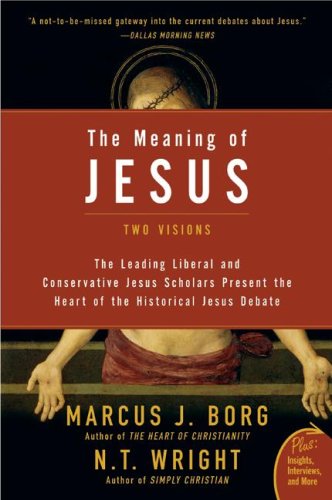Book review: The Meaning of Jesus
by Marcus J. Borg and N. T. Wright
★★★★★
Two of my favorite scholars, Marcus Borg and N. T. Wright, debate the meaning of Jesus. One is decidedly more conservative, but both are thoughtful and well-studied. And, raising hope for the future of Christianity, I would venture a guess that they are best friends despite their differences.
Wright believes the gospels are what they are “because their authors thought the events they were recording—all of them, not just some—actually happened.” This may sound self-evident to conservative Christians, but it is not the way Borg sees it. Two terms he uses to describe gospel writing are “metaphor historicized,” and its complement, “history metaphorized.” Borg just can’t jump on board with a literal reading of the gospels; he describes this outdated way of reading the Bible with five adjectives: literalistic, doctrinal, moralistic, exclusivistic, and afterlife oriented. This view, he says, has ceased to work for a large number of people, who find that if they must take the Bible literally, they cannot take it at all.
According to Borg, the “single most important difference” between these two scholars is their opinion about whether or not Jesus saw himself as the messiah. Wright says yes, Jesus understood his role as central to the salvation of the Jewish nation and, by extension, the world. Borg says no, Jesus’ role as messiah grew after his death and resurrection, as the understanding of his followers evolved.
In my opinion, the single most important difference in the thinking of these two scholars is not Jesus’ self-understanding, but the manner of his resurrection. Wright says Jesus rose in body, and showed himself physically to his disciples. Never mind that this new body could somehow walk through walls and disappear at will. “Resurrection,” to a Jew, meant a physical rising in body. Wright argues that only an event of this magnitude could have triggered the devotion and dedication of the Jesus movement that continued on after his death. In contrast, Borg seems unconcerned with the empty tomb, and interprets the resurrection in a more spiritual manner. I’m oversimplifying his position, but Borg sees Jesus being “raised to God’s right hand” as simply meaning Jesus has captured the position of Lord in the lives in his disciples. He is “raised up” by his followers after his death.
As I said, these are two of my favorite Jesus scholars. I believe Borg and Wright encapsulate liberal and conservative Christianity at their basic levels, and studying the two in tandem helps us appreciate the arguments of both sides. Great book!












 354 Circles
354 Circles
 603 Goodreads Friends & Fans
603 Goodreads Friends & Fans

 Hello! I'm an author, historical Jesus scholar, book reviewer, and liberal Christian, which means I appreciate and attempt to exercise the humanitarian teachings of Jesus without getting hung up on any particular supernatural or religious beliefs.
The Bible is a magnificent book that has inspired and spiritually fed generations for thousands of years, and each new century seems to bring a deeper understanding of life’s purpose. This is true of not only Christianity; through the years, our age-old religions are slowly transforming from superstitious rituals into humanitarian philosophies. In short, we are growing up, and I am thrilled to be riding the wave.
I avidly read all thought-provoking religion titles. New authors: I'd love to read and review your book!
Hello! I'm an author, historical Jesus scholar, book reviewer, and liberal Christian, which means I appreciate and attempt to exercise the humanitarian teachings of Jesus without getting hung up on any particular supernatural or religious beliefs.
The Bible is a magnificent book that has inspired and spiritually fed generations for thousands of years, and each new century seems to bring a deeper understanding of life’s purpose. This is true of not only Christianity; through the years, our age-old religions are slowly transforming from superstitious rituals into humanitarian philosophies. In short, we are growing up, and I am thrilled to be riding the wave.
I avidly read all thought-provoking religion titles. New authors: I'd love to read and review your book!
 Hi! While Lee writes the articles and reviews the books, I edit, organize, and maintain the blog. The views expressed here are Lee's but I'm his biggest supporter! :-)
Hi! While Lee writes the articles and reviews the books, I edit, organize, and maintain the blog. The views expressed here are Lee's but I'm his biggest supporter! :-)
Connect With Me!